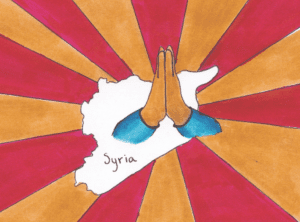By Max Kronstadt, The Catalyst
Recent chemical attacks and missile strikes thrust the now seven-year-long Syrian Civil War back onto the front pages and into the opinion columns of American newspapers for a couple of days last week. It was the most coverage the conflict has gotten since President Bashar al-Assad’s brutal campaign to retake Aleppo nearly a year and a half ago.
The stories painted a bleak picture of the conflict, and if you read too many of them you probably ended up, as I did, feeling profoundly hopeless about the future of Syria. The same is true for stories about conflict across the region, in Yemen, Gaza, Iraq, Egypt, and more. The Middle East, broadly speaking, is often portrayed as the world’s most hopeless region.
This hopelessness often quickly turns into apathy, which is inherently counterproductive. So, I’d like to put forward a counternarrative. It may not be warranted, or even possible, but I’m going to try. Underneath all the sectarian violence and brutal authoritarianism, there is hope for a peaceful, democratic future in the Middle East, and sooner than we might think.
Rebel forces in Syria have retreated into just a few remaining strongholds—soon they will have to surrender and accept some sort of settlement to end the war. As difficult as the idea of Bashar al-Assad staying in power is for most people to swallow, the end of the war will bring a degree of stability to a country that has driven instability across the region. It will be a long time before the Syrian people get justice for their government’s war crimes, but hopefully they can have peace.
In the past few months, there have been developments in neighboring Iraq. The Islamic State has been all but defeated. The central government and Kurdish separatists struck a deal to avoid war and create a working system to govern the heavily Kurdish region in the North. Sectarian tensions are, on the whole, lower than they’ve been in a long time, possibly since before the U.S. invasion in 2003.
Egypt had its first real elections in 2012, which the Muslim Brotherhood won resoundingly, but they were deposed by a military coup after a year of leading a less than democratic administration. Egypt is now as authoritarian as it was under Hosni Mubarak, which is discouraging. But the sentiments among the Egyptian people that led to the 2011 uprisings didn’t just vanish with the 2013 military coup, and when the people rise again, I believe they will have learned valuable lessons from their first foray into democracy and be successful in creating a durable, representative system.
I’ll admit, I’m struggling to find hopeful things to say about Yemen and Israel/Palestine, but I’ll give it a shot.
The Yemeni Civil War is really a proxy-war between Iran and Saudi Arabia. Iran supports the Houthi rebels that seized the capital in 2015, which the Saudis, with U.S. help, have subsequently bombed into quasi-oblivion, creating a humanitarian nightmare on the ground.
Though there is little hope for Yemen in the short-term, I do believe that the often-hot cold war between Iran and Saudi Arabia is due to simmer down at some point soon, which would help end conflict in Yemen and prevent similar conflicts in the future. Young Iranians largely do not share their parents’ generation’s geopolitical zeal—they care much more about the country’s economy—and have elected leaders to that effect. I suspect similar circumstances exist in Saudi Arabia, though they’re not nearly as visible.
A comparable phenomenon also exists in Israel. Young Israelis are increasingly frustrated with the hardline stance of Prime Minister Benjamin Netanyahu and his party; many do not believe Israel should continue building settlements in the West Bank and support the idea of a future Palestinian state. There are a lot of questions about what that state would look like, but until Netanyahu’s Likud Party is out of power, that is not a conversation that can take place—hopefully young, moderate Israelis can make that a reality sooner rather than later.
To realize the potential for a more peaceful and prosperous future, the Middle East will need good leadership, both internally and externally. From the U.S. and its allies, that means investing in rebuilding countries damaged by war to prevent further instability, are using leverage over allies to try to stop conflict wherever possible. This could be with Saudi Arabia in Yemen or Israel in the West Bank and Gaza Strip, then centering foreign policy around protecting the interests of the people of the region, instead of promoting their own economic or geopolitical interests. Internally, it means leadership that can transcend sectarian division to create new national identities, develop smart and sustainable economic policies, and studiously avoid corruption. I’m hopeful about the future of the Middle East, above all, because it’s better than the alternative. I hope you’ll join me.



















